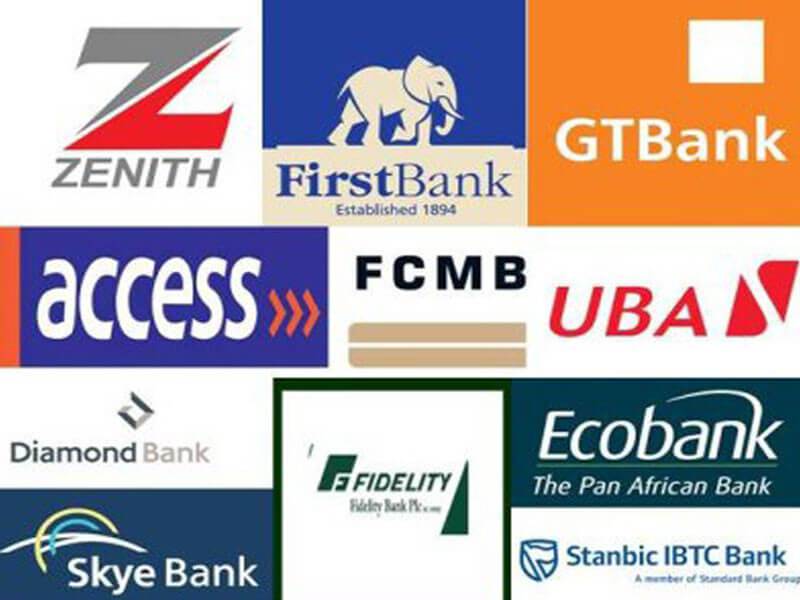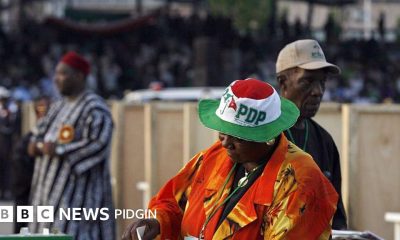Business
Nigerian Banks on Rough Patch to Recapitalization
Published
1 year agoon
By
Marcel Okeke
Since the announcement of the bank recapitalization policy in March 2024 by the Central Bank of Nigeria (CBN), the banking industry has been undergoing a flurry of activities—both on the part of the regulators and the operators. Indeed, the industry has been experiencing the good, the bad and the ugly in varying degrees. Consequently, three months into the recapitalization process, the banking sector index (at the Nigeria Exchange (NGX) Limited) fell 19.4 basis points to end the first half 2024 with a 7.5% loss—making it the worst performing indicator on the local bourse in the first six months of the year.
This is largely attributable to investors’ cautious trading and building speculation about likely merger and acquisition or even takeover which could weaken their investment. There is also the unforeseen ‘meddling’ by the CBN in form of its deviation from previously known definition of ‘qualified capital’ and restrictions on shareholders’ access to forex revaluation gains. Again, while the recapitalization process was underway the CBN opted to liquidate one of the banks—Heritage Bank Limited—a move that unleashed anxiety, uncertainty and speculations into the industry.
Practically all stakeholders, and especially potential investors, got drawn into the suspicion that some more banks would be liquidated by the apex bank. The speculation and suspicion were further underpinned by the fact that a few of the commercial banks were already known to be financially unhealthy—having very poor capital adequacy position, among other challenges.
Also, to the shock of all, the CBN at a point dabbled into the recapitalization process to consummate a merger deal between two of the banks: Unity Bank and Providus Bank. This move by the apex bank was made more bizarre by its opting to directly inject a whopping N700 billion into Unity Bank to properly ‘tie the knots’ with its partner. The granular details of this unprecedented deal are yet unknown to the banking public and potential investors.
Howbeit, snippets of information regarding the merger of the two banks in the course of the recapitalization process only generate more questions. One of the sequels of the CBN’s uneven-handed actions in the process has been sell-offs in especially tier-one banks stocks on the NGX, leading to drops in their share prices. Although this trend would seem to have trailed off over time, it ‘de-marketed’ many of the banks—especially in their fundraising drives.
From the fiscal authorities came a thunderbolt in the form of levying a retroactive “windfall tax” on the banks’ ‘forex gains’ as the recapitalization process was about picking up steam. Shockingly, the National Assembly raised the tax rate from 50% (requested by Mr. President) to 70%; and moved the tax timespan from being one-off (2023 only) to three years (2023—2026).
This retroactive tax, without a doubt, has altered the financial health or shape of the balance sheet of each of the affected banks: a reality that also whittled the worth of the banks to prospective investors. Indeed, the unprecedented and retroactive “windfall tax” is bound to negatively impact the banks’ profits, liquidity, and investor confidence. At the moment, full details of how to implement this tax are yet unclear.
Apparently, the unpredictability of the next line of action by the CBN, after the liquidation of Heritage Bank and matchmaking of Unity Bank and Providus Bank, pushed most banks to expedite action on their recapitalization journey. This is why, although the recapitalization timeline gives the banks April 2024 to end-March 2026, not a few banks have opted to ‘jump into the fray’ in the first six months of the two-year timespan.
This ‘rush’ by many of the banks to get done with the recapitalization could also be underpinned by ‘fear’ of the unknown. These unknowns come in the form of the regulator (CBN) changing the goal post intermittently; the fiscal authorities’ peremptory interventions as well as the possible deterioration of Nigeria’s macroeconomic environment. And truly, a number of fiscal initiatives of the Federal Government in the past few months constrain banks’ access to (equity) funds.
ALSO READ: Analysts back forex windfall tax on Banks, urge economic equity
In particular, the Government’s issuance of local dollar-denominated bond in August to raise $500 million robbed the recapitalizing banks of this chunk from the same investors. This is because the Government dollar bond was targeted at the same sets of investors as the banks: namely Nigerians in Diaspora, private equity investors and high net-worth persons with dollar assets. The bond has since reportedly attracted $900 million subscription.
The implication of this is that the same Nigerians in Diaspora, for instance, who would have opted to invest in the recapitalizing banks, may have invested in the Government’s dollar bond. For this to happen, the Government deliberately made the dollar bond attractive; and is also in the process of having it listed on the NGX. The bond was also given a five-year maturity time, and a bi-annual interest payment time.
All these, plus the regular Treasury Bills of the Federal Government, obviously amounted to crowding out the recapitalizing banks (in the capital market). Faced with this reality, many of the banks in the recapitalization drive had to opt for a combination of Rights Issue, Offer for Public Subscription, and Private Placement. So far, apart from the CBN-contrived merger between Unity Bank and Providus Bank, no other player is known to have taken that option.
However, even before the results of the fund raising outing of many of the banks (on the NGX) are made public, one clear pattern was that practically each one of them had to extend their subscription times. This is usually done when the targeted level of subscription is not attained within the initial given time. Or, to give room for the issuer (bank) to embark on more intensive/extensive drive for (prospective) investors.
Truly, most Nigerian retail investors are hard pressed at this point in time when the cost of living and level of inflation is sky-high—with the attendant low purchasing power. Unofficial reports indicate that none of the banks that made Rights Issue recorded full subscription, essentially because a huge chunk of their existing shareholders have been pushed into poverty or financial handicap—making them to fail to exercise their Rights.
However, as many of the banks post their half-year financial statements—showing stellar performance—investor sentiments are getting mixed. Particularly, many of the tier-one banks have reported double-digit ‘top-line’ and ‘bottom line’ growth in their audited financial statements for first half 2024. They have also declared and paid handsome interim dividend.
However, given the apparent desperation of the Federal Government in terms of efforts to improve its revenue profile, all economic agents (especially the recapitalizing banks) are compelled to thread with caution in the financial markets. This cautionary note is made more imperative by the Economic Stabilization Bill (before the National Assembly) through which the Federal Government could financially drain businesses by imposing more taxes and levies on the backdrop of fuel subsidy removal, among others.
The CBN’s latest hiking of the Monetary Policy Rate (MPR) to 27.25% (on September 24) against the expectation of practically all analysts and businesses is one of such shockers that could push the economy to undesired direction. As always, the apex bank claims its decisions are geared to reining in the runaway inflation trend.
The upshot of such MPR increases has been pricing of credit beyond the reach of most genuine businesses as well as rising operating costs. These however go to render the Nigerian business environment uncompetitive and unattractive. No wonder many corporate giants have in recent months opted to leave Nigeria. What options do the recapitalizing banks have? It is only to walk the rough patch?
- The author, Okeke, a practising Economist, Business Strategist, Sustainability expert and ex-Chief Economist of Zenith Bank Plc, lives in Lekki, Lagos. He can be reached via: [email protected] (08033075697 SMS only
Trending

 Latest2 days ago
Latest2 days agoYoruba film industry mourns as popular actress aunty Ajara passes away

 Trends3 days ago
Trends3 days agoTonto Dikeh reunites son with Churchill after decade-long split

 Energy1 week ago
Energy1 week agoNNPC unveils gas master plan to boost Nigeria’s energy sector

 Education1 week ago
Education1 week agoAchievers University expels 15 female students over indiscipline

 Latest1 week ago
Latest1 week agoPDP affirms leadership from Ibadan convention after Federal High Court ruling

 Business5 days ago
Business5 days agoRite Foods positions industry as catalyst for Nigeria’s clean energy transition

 Football5 days ago
Football5 days agoArsenal’s Osman Kamara completes permanent move to Blackburn Rovers

 Health4 days ago
Health4 days agoControversial preprint revives vaccine–autism debate, draws sharp pushback from medical experts

